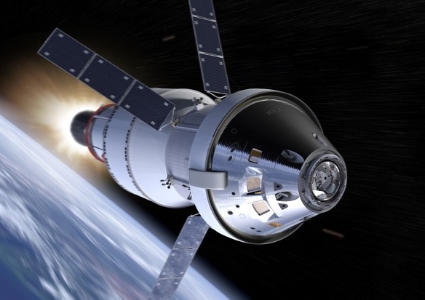Trustee Election
These are the original issues in this subcategory
- PLANETARY DEFENSE
- EXTRATERRESTRIALS
- SPACE EXPLORATION
Our space program has achieved many major milestones over the last 50 years. We have safely landed men on the moon, placed the Hubble telescope in orbit, developed the space shuttle, helped construct the international space station, landed 4 rovers on Mars and sent robotic spacecraft to the far reaches of our solar system and beyond. Some support sending astronauts back to the moon to establish a semi-permanent base for future manned missions to Mars and other destinations. Our next generation of spacecraft, called the Orion Crew Exploration Vehicle, is somewhat similar in design to our Apollo-era spacecraft. The deep-space capable Orion consists of a cargo launch vehicle and a crew exploration vehicle. It accommodates 4 to 6 crewmembers and, like Apollo, Orion will reenter Earth’s atmosphere using parachutes and a heat shield. Ultimately, a modified version of the Orion spacecraft is expected to take astronauts to the moon in mid-2027 and perhaps to Mars thereafter. Analysts estimate the cost of building these vehicles and constructing a lunar base to be at least $130 billion. Opponents say the money used for these projects could be better spent here on Earth.
Some scientists have questioned the need for a lunar base and the wisdom of manned deep-space exploration. They say many obstacles must first be overcome before subjecting humans to prolonged space travel in microgravity environments. These obstacles include bone-density loss, sleep problems, radiation exposure and psychological adjustment issues. The damage from micro-meteors traveling at thousands of miles per hour and impacting a spacecraft has also not been addressed. Space travel supporters claim a lunar way-station used as a fuel depot and manufacturing site to stage longer missions, makes sense. They claim it would further our knowledge of the long-term effects of low gravity and space radiation on human physiology. They also say the moon’s water resources will facilitate this effort. Opponents argue that manned space exploration is not worth the risk to human life when robotic missions can accomplish more and at a much lower cost. NASA is now operating more than 50 robotic spacecraft that are studying Earth and our solar system, with another 40 unmanned missions in development. Manned-flight supporters claim the problem with robotic machines is that they will only do what they are programmed to do and can only detect the expected. They say robots cannot be programmed to detect the unimaginable, the unknown, or the strange non-carbon life that may someday be encountered.
Proposed Legislation: Introducing legislation to study whether the challenge of space travel is feasible given our current state of technology
Prospective Sponsor: Sen. John Cornyn (TX)
Some scientists have questioned the need for a lunar base and the wisdom of manned deep-space exploration. They say many obstacles must first be overcome before subjecting humans to prolonged space travel in microgravity environments. These obstacles include bone-density loss, sleep problems, radiation exposure and psychological adjustment issues. The damage from micro-meteors traveling at thousands of miles per hour and impacting a spacecraft has also not been addressed. Space travel supporters claim a lunar way-station used as a fuel depot and manufacturing site to stage longer missions, makes sense. They claim it would further our knowledge of the long-term effects of low gravity and space radiation on human physiology. They also say the moon’s water resources will facilitate this effort. Opponents argue that manned space exploration is not worth the risk to human life when robotic missions can accomplish more and at a much lower cost. NASA is now operating more than 50 robotic spacecraft that are studying Earth and our solar system, with another 40 unmanned missions in development. Manned-flight supporters claim the problem with robotic machines is that they will only do what they are programmed to do and can only detect the expected. They say robots cannot be programmed to detect the unimaginable, the unknown, or the strange non-carbon life that may someday be encountered.
Proposed Legislation: Introducing legislation to study whether the challenge of space travel is feasible given our current state of technology
Prospective Sponsor: Sen. John Cornyn (TX)

- I oppose reforming current space exploration policy and wish to donate resources to the campaign committee of Leader John Thune (SD).
- I support studying whether the challenge of space travel is feasible given our current state of technology. These challenges include:
1.) Human health and safety risks from space radiation and microgravity; social isolation, stress, and potential psychological strain for astronauts living in small, confined spaces; and the difficulties of handling medical emergencies far from Earth, making real-time guidance impossible.
2.) Technological and logistical challenges relating to distance - making space travel time-consuming and complex; resources - astronauts require a constant supply of food, water, and other resources, which is difficult to provide for long-term missions; and communication - significant communication delays occur over long distances, hindering mission control's ability to assist with emergencies.
3.) Financial and societal concerns that space exploration is extremely expensive, leading to debates about whether these funds could be better spent on pressing issues on Earth, such as poverty, healthcare, and climate change.
4.) Risk and reward concerns that prompt critics to question the value of human missions compared to robotic ones, which can achieve similar scientific results at a lower cost and without risking human lives.
And wish to donate resources to the campaign committee of Sen. John Cornyn (TX) and/or to an advocate group currently working with this issue.
There has been $ 0.00 pledged in support of this issue
Trustee Election - Opening Date
October 27, 2025
Trustee Election - Closing Date
November 3, 2025
